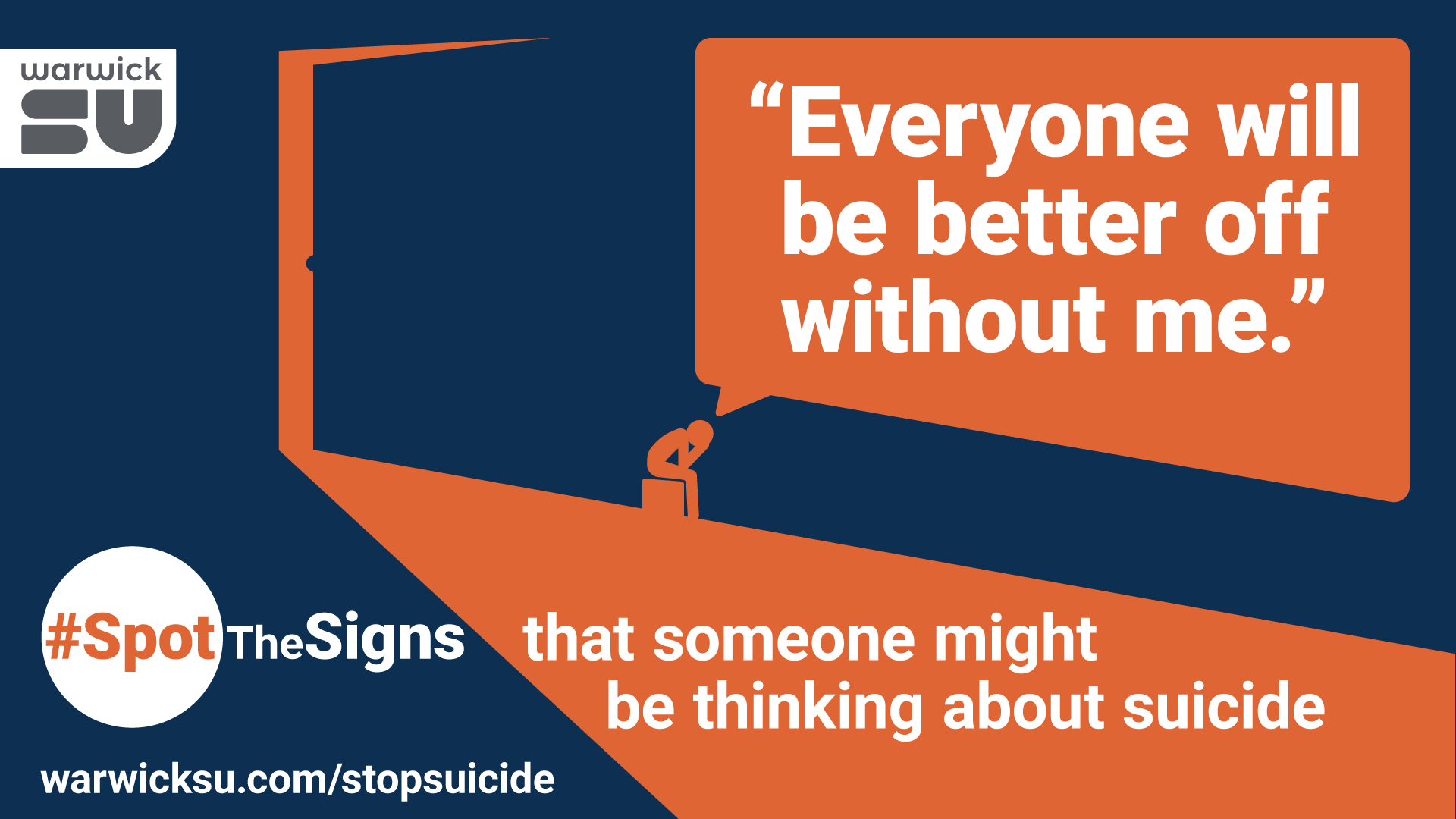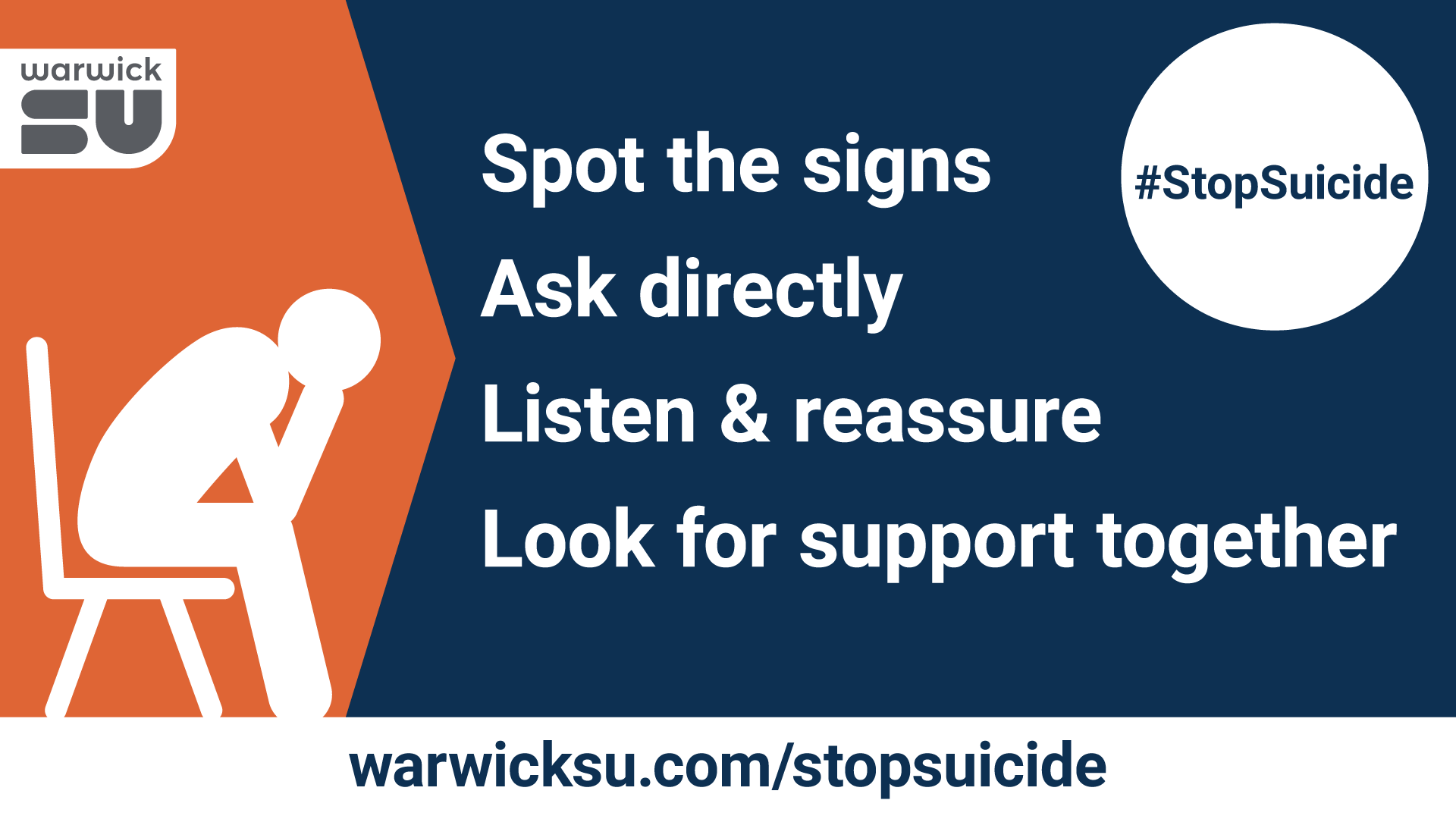
We want to #StopSuicide, so we're helping one another to #SpotTheSigns and #BreakTheSilence.
#SpotTheSigns - Signs that someone might be thinking about suicide

Some common signs that someone might exhibit if they are thinking about suicide include:
- Giving away their possessions
- Withdrawing from social situations
- Harming themselves
- Physical changes such as neglecting their appearance or hygiene
- Disrupted sleep pattern, sleeping too much or too little
- Loss of appetite
- Talking about wanting to die, or about killing themselves
- Researching ways someone can kill themself
- Talking about feeling worthless, hopeless or having no purpose or reason to live
- Talking about feeling trapped or being in unbearable pain
- Talking about being a burden to others
- Increasing use of alcohol or drugs
- Acting anxious, agitated, reckless or impulsive
- Extreme mood swings
- Talking or writing in depth about death, dying, or suicide
- Making a sudden recovery after a period of depression
- Visiting or calling people unexpectedly to say goodbye, directly or indirectly
- Making arrangements for after their death, setting their affairs in order
Some verbal cues might include the use of phrases like:
- “Everyone will be better off without me”
- “All of my problems will end soon”
- “I just can’t take it anymore”
- “I don’t want to carry on”
However, anyone can experience thoughts of suicide and there is no definitive guide on how to tell if someone is suicidal.
Often, identifying the signs requires your own knowledge of that person and their usual behaviour.
If something doesn’t feel quite right, explore it further by asking them directly if they are experiencing thoughts of suicide.
#BreakTheSilence - Ask if someone might be thinking about suicide
Stigma surrounding suicide creates silence, and silence kills.
It’s a myth that talking about suicide risks putting the idea in someone’s head. Talking about suicide does not make a suicide attempt more likely. The risk is in not mentioning it at all.
Ask directly if someone is considering suicide if you’re worried about them.
Are you thinking about suicide?
By asking directly and using the word suicide, you’re telling them that it’s OK to talk openly about thoughts of suicide with you.
If they confirm that they have thoughts of suicide, you can use the conversation pointers below to support your conversation. Sources of support, for them and yourself, are listed at the bottom of this page.
Share our ‘I’d ask. Share if you’d ask too…’ campaign from your social media accounts to help tackle the stigma of talking about suicide.

#StopSuicide - Supporting someone who is thinking about suicide

If someone is suicidal, you can support them by listening and allowing them to express their feelings. Many people feel a huge sense of relief simply knowing that someone is willing to listen. Then reassure them that they are not alone and you can look for support together.
Below are some conversation pointers and helpful phrases for having a conversation with someone who is thinking about suicide:
Once someone has disclosed that they are thinking about suicide, you might prompt them to talk about any contributing factors so you can identify appropriate support services.
“What has brought you to this point?”
“Are you able to tell me why you’re considering suicide?”
You might want to empathise and encourage them to continue talking at points.
“It sounds as though things are really tough for you at the moment… Could you tell me a bit more?”
“I’m so sorry you’re feeling this way. Can you tell me more about how you’re feeling?”
You can reassure them that you are there to listen and support them.
“Things must be so painful for you to feel like there is no way out. I want to listen and help.”
You can reassure them that they’re able to tell you in their own time and that they don’t need to rush.
“Take your time, I don’t have to be anywhere else.”
“Don’t feel like you have to rush, we can take as long as you need.”
You might want to acknowledge that you understand how difficult talking about suicide can be.
“It’s hard and scary to talk about suicide, but take your time and I will listen.”
“You’ve shown a lot of strength in telling me this. I want to help you find support.”
It is helpful to explain that they are not alone in experiencing thoughts of suicide, and that support is available.
“It’s not uncommon to have thoughts of suicide. With help and support people can work through these thoughts and stay safe.”
There are many fantastic organisations that you can support someone who is thinking about suicide to access.
“There are organisations that offer support, like PAPYRUS who run HOPELINEUK. We can find their contact details together.”
Below you can find details of specialist support services for anyone with thoughts of suicide, and their supporters.
(adapted from PAPYRUS’ Conversation Starters)
Support services for those considering suicide & their supporters
PAPYRUS
PAPYRUS aim to reduce the number of young people who take their own lives by shattering the stigma around suicide and equipping young people and their communities with skills to recognise and respond to suicidal behaviour.
PAPYRUS provide confidential support and advice to young people struggling with thoughts of suicide, and anyone worried about a young person through their helpline, HOPELINEUK.
PAPYRUS have compiled a directory of other national & local support services that someone who is experiencing thoughts of suicide may benefit from. They include support services relating to sexual violence, domestic abuse, child abuse, bereavement, self harm, forced marriage, mental health, sexual health, and homelessness.
Samaritans
Samaritans’ vision is that fewer people die by suicide. They operate a 24-hour listening service, email, letter, and face to face service.
CALM
The Campaign Against Living Miserably (CALM) run a free, confidential and anonymous helpline as well as a webchat service, offering help, advice and information to anyone who is struggling or in crisis.
Warwick Wellbeing Support Services
Wellbeing Support Services provide a range of services to support the mental health and wellbeing of Warwick students across a wide range of issues, including thoughts of suicide.
